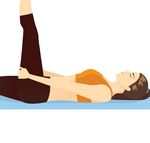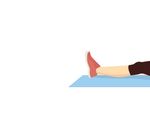Your guide to three key exercises for reducing knee pain
←
→
Page content transcription
If your browser does not render page correctly, please read the page content below
Your guide to three key exercises
for reducing knee pain
Many adults in the United States and around the suffer from strain and added pressure that cause
world suffer from long-lasting knee pain. This pain and limit your mobility.
pain is a problem because it limits your mobility
Since weak and stiff muscles contribute to knee
and can even make it difficult for you to stand up
pain, it’s important that you exercise to help build
or sit down.
up their strength and flexibility. The challenge
A significant contributing factor to knee pain with this is finding exercises that are gentle on
is weak and stiff muscles in your legs. These your joints but effective enough to produce
muscles control your hips and knees. To do results. In this guide, we’ll go over three exercises
this, they must remain strong and flexible. When that are gentle on your body but effective in
they’re not, your knees and hips can begin to improving your strength and flexibility.
#1 Hip bridge raises
Hip bridge raises are a simple exercise that targets the gluteal muscles. The glutes are connected to
the movement of your knees. When they’re stronger and more flexible, they provide more stability and a
greater range of motion for the knees (and the hips).
Hip bridge raises can be done almost anywhere on a flat
surface, so they’re great to do from the comfort of your own
home. Here are the steps to follow to do hip bridge raises:1. Lie with knees bent and both feet placed on 4. Repeat 10 to 15 times a few times per day for
the floor with arms crossed over your chest. two to three days per week.
Your back and feet should be flat against the ground. This exercise takes very little time out of your
Keep your body as straight and even as possible. schedule. You can do it at home before work and
again when you get home a couple of days per
2. Raise your hips off the surface by squeezing week. After committing some time to this exercise,
your gluteal muscles. you should begin to notice a difference in the way
Drive your hips upward, focusing the effort of your your knees feel.
movement with your gluteal muscles. You should
feel as though you are squeezing or tightening the
gluteal muscles.
3. Attempt to bring the hips up to where they
are in line between the knees and shoulders.
The goal is to create a straight incline from your
knees to your shoulders. If it causes too much
pressure to raise your hips this high, then stop where
it’s comfortable. With time, you may be able to push
yourself further as your muscles grow stronger.
#2 Doorway hamstring stretch
The hamstrings are a group of large muscles on the back of each thigh. Their primary responsibility is
to flex the knee. Tightness and stiffness in the hamstrings make it more painful when trying to bend your
knee and can keep you from bending over to reach objects on the ground.
The doorway hamstring stretch is a simple stretch you can do every day in the comfort of your home. All
you need is a doorway. Here are the steps to follow to do doorway hamstring stretches:
1. Lie on your back in an open doorway. 3. Hold for at least one minute.
Position yourself to where one leg is going through When you have your leg as straight as you’re
the doorway and the other is bent and touching comfortable holding it, stay in this position for at
the wall with your toes. Keep your back and your least one minute. If you want to hold the stretch
other leg in the doorway flat against the ground for longer, you can stay in position for up to six
throughout the duration of the stretch. minutes if you’d like. Once finished, slowly lower
your leg back to the ground. Switch legs and
2. Slide your leg up wall. repeat the stretch with your other leg. Do this
Slide the foot of your leg that’s against the wall up stretch two or three times for each leg.
the wall slowly. Try to straighten your leg as much
as possible. As you slide your foot up the wall,
you’ll switch to pressing your heel against the wall
instead of your toes as your leg gets more straight.#3 Squats
Your hamstrings, quadriceps and gluteal muscles in your thighs are all connected to the movement
of your knees. Strengthening these muscles helps you maintain strength and flexibility in the knees.
The squat is a simple exercise you can do at home two or three times a week to engage these muscles,
as well as your core. Here are the steps to follow to do squats:
1. Stand with your feet apart and parallel to
each other.
You’ll want to position your feet far enough apart
to where you can squat downward comfortably
without losing balance. If keeping your feet
forward feels unnatural, feel free to let the toes
shift outward a little bit until you feel like you can
maintain balance well.
2. Keep your back straight and hold your arms
out in front of you.
Holding your arms straight out in front of you
helps keep your chest up and your spine straight
throughout the exercise. It also helps you maintain
your balance.
5. Raise yourself back up.
3. Squeeze your abs and squat down Once you’ve reached your low point in the squat,
As you begin to squat, you should squeeze your you’ll raise yourself back up to a standing position.
abs and begin your movement at the hips. As your When you do this, focus on driving your knees
hips bend, you’ll want to drive your knees forward outward and squeezing your glutes to engage
and your bottom backward. Your knees should these muscles.
naturally spread outward as you lower. Your body
6. Repeat.
weight should drive mostly into your heels if you’re
Do 10 to 20 squats per day depending on your
doing this correctly.
comfort level.
4. Try to get your hips below your knees.
The goal of a good squat is to lower your hips
below your knee level. If this is too far for you,
don’t worry about it. Go as far as you can before
raising back up. As you practice this exercise more
frequently, you’ll improve your ability to lower
yourself farther down.
Visit BorderTherapy.com to learn more.
Visit Border Therapy Services for a complimentary screening
Do you have questions about these exercises and more to reduce knee pain? Our physical
therapists at Border Therapy Services can examine your condition and guide you through the
exercises and stretches that will be most helpful. Contact our team today for more information
about knee exercises or to schedule a complimentary screening.You can also read






















































